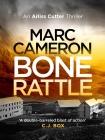Bone Rattle, Marc Cameron [fun to read txt] 📗

- Author: Marc Cameron
Book online «Bone Rattle, Marc Cameron [fun to read txt] 📗». Author Marc Cameron
The lead assistant US attorney – or AUSA – had stood at the lectern for fifteen minutes straight, apparently enjoying the sound of his own voice as he addressed the court about the medical problems of a witness who needed to be brought up from Seattle. Vital information for the wheels of justice, but one of the many boring bits of minutia that deputies had to take in every day when they pulled court duty.
The Hernandez brothers leaned on their elbows at the defense table, to the left of the lectern. Both of their attorneys were court appointed at taxpayer expense, despite the fact that the brothers surely had several cash stashes they’d conveniently left off of their financial disclosure forms at the time of their initial court appearances after arrest.
Half a dozen members of the audience were nodding off in boredom ten minutes after returning from lunch. Only a couple seemed truly interested in the proceedings. A young Native woman perched on the edge of her seat on the second row, the area reserved for journalists. She was dressed professionally – for Alaska – with well-worn KEEN hiking shoes, stylish polyester slacks, and a pullover fisherman’s sweater of natural wool. She turned every two or three minutes to look over her shoulder at the double doors at the back of the courtroom, as if she were expecting someone to burst in with news that would exonerate or convict the defendants. Cutter couldn’t tell from her expression which side she was on – if any. She appeared to be as interested in the show being put on by the lawyers as he was.
Lawyers were always filing motions to exclude evidence or for a summary judgment, extolling the virtues of their freshly scrubbed clients who looked nothing like they did at the time of their arrest. Cutter had thought it maddening when he was a young deputy, all their posturing for the judge and jury, even outright lying to make a client look less like his real self. Deputy marshals saw the defendants outside of the brightly lit, sanitized courtrooms. Deputies listened to them yammer as they shuffled in belly chains, handcuffs, and leg irons down narrow hallways back to the cellblock. Deputies brought them their lunch, handed them toilet paper, escorted them to rooms to see their attorneys. The judge might order a defendant’s white supremacist tattoos covered for the jury. The family could bring a new suit of clothes. But deputies were everyday witnesses to the uncensored versions. They were privy to offensive ink, knife wounds, and colostomy bags that juries never saw. Deputies listened to prisoners curse their fate and watched them break down and cry. Deputies were cordial, friendly even, but never friends.
From what Cutter had seen, Judge Shawna Forsberg understood.
She’d come to the bench from fifteen years at the Federal Public Defender’s Office after working five at the state level. Cutter had talked to a couple of the senior deputies in district who’d known Forsberg as a fierce advocate for her clients in court, no matter how heinous their crimes. When word came down of her nomination, everyone believed she’d be a pushover judge – but the opposite held true. Some of the defendants called her Frosty Forsberg, and not just because of her silver hair. She ruled her courtroom with an iron hand, maintaining cool detachment, absolutely unmoved by stories of rotten childhoods, poverty, attention deficit disorder, or any of the litany of excuses attorneys used to justify the criminal behavior of their client. She’d heard the stories before, used many of them herself, and wasn’t buying any of it now that she was on the bench. It made perfect sense when Cutter thought it through. Some of the most lenient judges he’d ever seen were former prosecutors – likely wanting to balance the scales for all the people they’d sent to prison. The strictest were often former defense attorneys. Judge Forsberg was the closest thing to a hanging judge on the federal bench in Alaska. If he was forced to work court, Cutter preferred the decorum she expected in her trials. She thought out her rulings carefully, but once she made the decision remained unmovable to all further arguments.
When she decided to sequester the jury, no amount of fast talking from the defense or objection from the government was going to change her mind. Yes, she knew it would be expensive. She knew it would be difficult. But in her mind, it was the “rightest and safest” thing to do.
Five minutes later, the blue-blazered court security officer brought in the fifteen jurors – twelve primary and three alternates. They sat in stunned silence at the news.
Judge Forsberg explained the details of sequestration, reading word for word from her well-crafted order so there would be no question when the marshals enforced the rules she was imposing.
Each juror would hand over his or her cell phone to a representative of the US Marshals Service. They would be driven home to retrieve a week’s worth of clothing and toiletries, medications, etc., after which they would be driven to a local hotel by a deputy marshal. There, they would each be assigned a private room. They were to have no contact with anyone outside of the court or jury room – including each other – unless supervised by a deputy marshal. Jurors would be permitted a phone call to their significant other each evening. This call would be via land line in a specially prepared room in the hotel and monitored by a deputy marshal. Jurors would be escorted to breakfast and supper by a deputy marshal. Novels, approved by the court on a case-by-case basis, were allowed, and movies – chosen by Inspector Scott Keen, the deputy marshal in charge – would be shown each evening in a common area of the hotel. Judge Forsberg thanked each juror by name for his or her sacrifice, noting that there was “no service save military service





Comments (0)